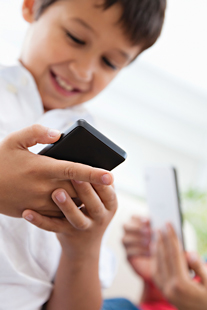 Q. All of my son’s friends are on Instagram and most of them have Facebook pages. He’s twelve. What do you think about kids and social media?
Q. All of my son’s friends are on Instagram and most of them have Facebook pages. He’s twelve. What do you think about kids and social media?
A. Social media is an increasingly larger part of the way we all communicate with family, friends, and acquaintances. Most adolescents are using sites such as Instagram, Facebook, and Twitter to interact with friends, share pictures, and post updates on their lives. There can be positives to adolescents using social media, when they are ready for this responsibility (most sites require that the user be at least thirteen years old) and when parents are prepared to provide the guidance needed to access it safely. Adolescents can enjoy connecting with their friends, learn new things, collaborate with others, and express themselves while on social media sites.
Social media access also brings with it many issues related to privacy and safety. Perpetrators of child abuse have used social media to gain access to children, kids can engage in bullying behavior online, and some teens have impulsively posted text or pictures that have harmed their reputations or triggered legal problems. Because of these issues, adolescents need ongoing monitoring and supervision by their parents in order to utilize social media safely.
Social media services like Facebook and Instagram provide endless opportunities for social interaction and self-expression with a vast audience. Messages and pictures on these sites take less than a minute to post, but do not fade away as quickly. This creates a challenge for adolescents who are notoriously impulsive and emotionally reactive. Research indicates that the brain functions involved in filtering and controlling emotional, impulsive responses are not fully developed in the adolescent Brain. When adolescents use social media, this places them at risk of posting text or pictures without fully thinking through the consequences for themselves or others. They need the wisdom and maturity of their parents to help them navigate their choices online.
Here are some tips for helping your adolescent with social media.
• Listen and talk about social media with your teen. Find out what services or apps they use or want to use. Explore how they use their account and what content they feel would be inappropriate to share online. Honor the importance of social media in a teen’s world to facilitate open conversation on the topic.
• Sign up for your own accounts and follow or friend your child. This allows you to monitor what your child is sharing with others online. When Something of concern comes up, address it. Have your child sign in to their account with you and ask for a tour of the site.
• Set limits. Decide how much time should be spent on social media (after homework and other responsibilities are completed) and be consistent with enforcing this limit with your teen.
• Maintain control of the hardware. Common family rooms are the best place for teens to access the Internet. When an adolescent is new to using the Internet, it is especially important for it to be done when a parent is available to supervise. Consider keeping smart phones, tablets, and computers out of the teen’s bedroom when it is time to settle in for the night. These devices can be a tempting distraction from getting a good night’s sleep.
• Always monitor privacy. Learn about the privacy controls available on the sites your child is using. Insist they be set to the most private option. Talk with your teen about interacting with only those people they know and trust. Some sites allow you to post your location online, but this isn’t safe for adolescents. Remind teens that no privacy control can prevent others from copying and pasting their posts and sharing them with anyone. Good advice for all ages: If you wouldn’t say something to a person’s face, don’t key it into a comment field, tweet it, or text it. Period.




